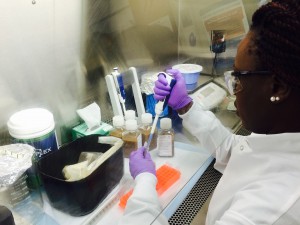Podcast: Gross Science
-
-
slice.mit.edu
- 3
Filed Under
Recommended
Thankfully, Mark Smith PhD ’14 isn’t the average person. A microbiologist, Smith came to MIT to study this huge community of bacteria known as the microbiome, focusing specifically on the bacteria in the gastrointestinal tract. Smith worked in the Alm Lab. He explains some of his research, “We would find healthy patients and a disease cohort, take stools samples to sequence their microbiome and find signatures that distinguish between them. We find there are a lot of diseases that have distinct microbial compositions. The question is does disease cause the altered microbiome, or does the altered microbiome cause the disease?”
This question and ones like it are what led Smith to co-found OpenBiome, a non-profit stool bank that supports research of the human microbiome. How does a stool bank connect to microbiome research? Stool samples offer an impressive look at the bacteria inside the gastrointestinal tract and researchers have found that bacteria in healthy people is often different from the bacteria in less-than healthy people. Because of this, fecal transplants—transplanting stool from one individual to another—are being explored as treatments for disease, infection, and digestive issues. OpenBiome works to facilitate these transplants specifically for an infection known as C. Diff.

In this Slice of MIT podcast, you’ll learn how fecal transplants work, why they’re effective in combating C. Diff, and what the future of microbiome research looks like.
Listen to podcast above or on the Alumni Association’s SoundCloud page and don’t forget to subscribe on iTunes and rate the podcast and leave a review. Tweet your thoughts on this episode to @mit_alumni.








Comments
Alan Friot
Thu, 10/29/2015 2:53pm
Are they making the distinction between cause and protection from?
Yasushi Nozawa
Mon, 12/07/2015 10:55pm
The effectiveness of fecal transplant was discovered in 1950s. Unfortunately, this miracle treatment was ignored almost 60 years until 2012. Even today, fecal transplant, or official name Fecal Microbiome Transplantation (FMT), is not universally accepted because of its gross-ness. I have documented the early history of FMT in my book, "Fecal Transplant" by Yashi Nozawa (Pen name) thay is available from Amazon.
Nicole Morell
Thu, 10/29/2015 4:09pm
Hi Alan, Do you mean protection from C. Diff? Currently OpenBiome facilitates treatments for recurrent C. Diff, no applications for prevention yet.